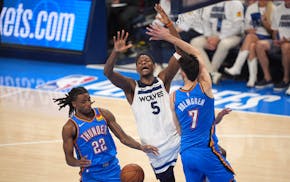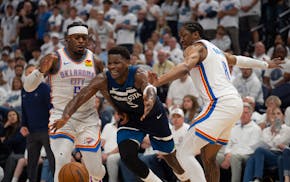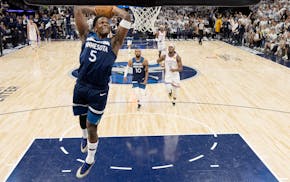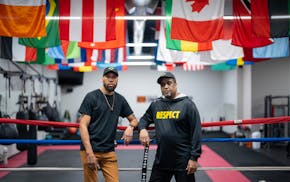Lynx boss Cheryl Reeve is the coach of Team USA, succeeding South Carolina coach Dawn Staley, who succeeded UConn coach Geno Auriemma.
She also corresponds with Maryland coach Brenda Frese, who coached at the University of Minnesota before leaving for Maryland, where she has won a national title.
That confluence of coaches involves mutual respect and admiration, and plenty of communication.
Which is why it wasn't surprising to see, at the Lynx's draft introductory news conference, players from Maryland, UConn and South Carolina sitting next to one another.
Next to Reeve sat Maryland star Diamond Miller, the second pick in the draft, who played for Frese.
Next to Miller sat Dorka Juhász, who played for Auriemma.
Next to Juhász sat Brea Beal, who played for Staley.
Next to Beal sat Taylor Soule, who played for Virginia Tech.
Lynx great Maya Moore attended UConn, like second-round draft pick Juhász.
Lynx great Lindsay Whalen played for Auriemma on Team USA — along with Moore and fellow future Lynx Hall of Famers Sylvia Fowles and Seimone Augustus — and played for Frese at Minnesota.
Current Lynx star Napheesa Collier played for Auriemma at UConn and Staley in the Olympics.
Staley, Frese and Auriemma recruit not just talent, but attitude. They recruit winners who embrace hard coaching.
So when Reeve drafts a player such as Miller, she is not merely basing the decision on film work. If Frese hadn't championed Miller to Reeve, Miller would not have been in the Target Center atrium on Thursday.
This was an unusual draft. Given the depth of talent on WNBA rosters, there was only one prospect considered a sure thing: South Carolina's Aliyah Boston, who went with the first pick to the Indiana Fever.
Miller's profile is not typical of a No. 2 pick. She is not a dominant scorer, rebounder or a point guard, and she needs to refine her shooting.
What she does is immediately make an incomplete Lynx roster more intriguing.
Miller is as close to a positionless player as the Lynx have ever had. She can handle the ball, create, dish, rebound, score inside, get her own shot and defend almost any position.
With Fowles no longer commanding space and touches inside, Miller and Collier become the core of what the Lynx are trying to build: A modern team with versatile athletes who can play with pace.
Miller and Collier are long and athletic. They can defend one-on-one and excel at deflections, and both are unselfish, high-energy players.
Yes, Miller will have to improve her shooting, but she's adept at improving, as she proved at Maryland.
Perhaps just as important, Miller possesses the personality of a star. She likes bright lights.
Thursday, during the Lynx's news conference, Miller joked about loving "reality TV.'' At the WNBA draft, she allowed a reporter to follow her as she chose outfits for her various appearances.
What was most striking about Miller and her new teammates at the news conference was how polished and comfortable they all were. They have played women's college basketball for high-powered coaches at a time when the game is more popular and visible than ever. The Lynx should benefit from that experience.
With the retirement of Fowles, the championship Lynx era is officially over. One facile notion passed around before and after the draft was that Miller, because she is the highest Lynx draft pick since Moore went No. 1 in 2011, is comparable to Moore.
That's not only untrue, it's unfair.
When Moore was drafted, she was already one of the best players in the world. Miller shouldn't be saddled with those expectations.
The Lynx had five future Hall of Fame players on the court at one time. That might never happen again — here or anywhere.
There is really no need to compare eras anymore. Enjoy Miller's game for what it is, and what it could become.

Souhan: Wolves' weak performance in Game 5 invites change, so don't let it shock you

Souhan: Edwards and Randle flop in the Timberwolves' biggest game of the season

Souhan: Twins' Baldelli and Timberwolves' Finch have a lot in common. They ought to talk.

Souhan: Edwards shows clearly the worth of basketball's key skill — jump shooting


